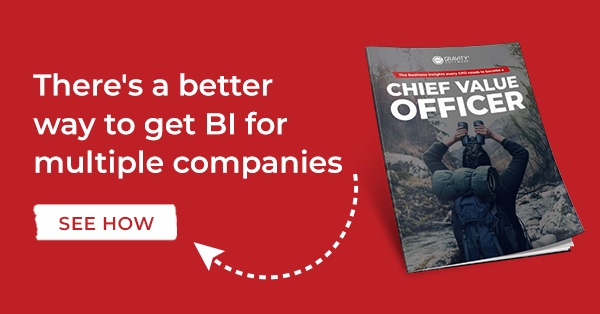Accounting after a business combination: what every CFO needs to know

While 2022’s volatility has caused a slowdown in merger and acquisition (M&A) activity, global firm PwC asserts it's still a "fiercely competitive deals marketplace." Among CFOs the firm surveyed in January, 35% saw pursuing corporate M&A, joint ventures and alliances as "very important" to their company's ability to grow this year. The number rises to 47% when considering all executives.
In business, as in life, the merging of two entities is often an occasion worth celebrating—but it's not without its challenges. From blending corporate cultures and deciding on a home base to, crucially, integrating finances, the complexities arise here.
Here’s what you need to know about accounting for business combinations and how Gravity Software can streamline the process.
Acquisition accounting considerations for CFOs
Deciding how to properly integrate finances
When companies merge or one acquires another, proper accounting procedures are essential. With the right accounting software, newly acquired or merged companies don’t have to relinquish their financial autonomy immediately, or at all.
An acquired company can create separate financial statements from its parent company after acquisition. According to ASC 805, the company can either use its own historical carrying amounts for acquired assets and liabilities, or adopt the new basis of accounting set by the parent company (referred to as “pushdown accounting”).
Gravity Software’s multi-entity accounting capabilities allow financial data from all of an enterprise’s entities to be stored in a single database, ensuring that an acquired company can maintain its own financial statements while still providing full visibility to the parent company. This ensures seamless integration without sacrificing autonomy.
In some cases, combining finances makes sense. For example, a subscription-based SaaS company that acquires a consulting firm aiming to expand its customer base may want to maintain separate general ledgers while sharing customer and vendor information across both entities. Gravity’s multi-entity accounting features make this kind of integration simple by consolidating financial reporting across companies.
Example 1:
A multinational conglomerate gains significant buying power through acquisitions. When it purchases thousands of office chairs at a substantial discount, Gravity Software allows the parent company to apply this discount to all its subsidiaries at once. It automatically updates the ‘Due To’ and ‘Due From’ accounts, allowing each subsidiary to track the expense in its local currency—even when the original transaction was made in US dollars.
Multi-entity reporting in M&A transactions
The importance of financial transparency in M&A
PwC notes that companies engaged in M&A should have a multi-year capital allocation plan and regularly assess the growth and profitability potential of their portfolio companies. Achieving this requires full visibility into the financials of each portfolio company.
With Gravity Software, investors can easily analyze financial performance across multiple companies within an organization. This is essential for identifying discrepancies, such as why one company’s profit margins are lower than others, and understanding where to allocate resources or make adjustments.
Gravity Software’s Consolidated Financial Reporting allows for side-by-side comparisons of key performance indicators (KPIs) across companies, providing full transparency and insight. Additionally, the software integrates seamlessly with Microsoft Power BI, helping stakeholders visualize trends and key data with colorful dashboards.
Example 2:
An investor can quickly assess how revenue and expenses for a portfolio company compare to others, which helps in making decisions about capital infusion, divestitures, or supplier negotiations.
Tax and compliance challenges after business combinations
Streamlining tax and financial reporting after M&A
Compiling financial data for tax and reporting purposes is challenging, particularly when new entities are involved in a business combination. According to PwC, multi-entity businesses often suffer from data silos, which creates inefficiencies and increases the risk of errors.
Inaccuracies in tax and reporting can have serious financial, reputational, and legal consequences, so ensuring accuracy is essential.
Gravity Software eliminates these challenges by centralizing financial data from all entities in a single database. There’s no need to manually compile data from multiple spreadsheets or systems, as all data is accessible in real-time with zero manual entry. This reduces errors and streamlines reporting.
Gravity Software also integrates with Microsoft Power Automate to automate repetitive tasks, freeing up staff to focus on more strategic, value-adding work.
Why choose Gravity Software for multi-entity accounting
Grow your business with the right accounting solution
Business combinations are a powerful way for companies to solidify their position in a market, eliminate competition, or acquire new technology. But as your business grows through mergers and acquisitions, you need a multi-entity, multi-functional accounting solution that scales with your operations.
Even if this is your first acquisition, Gravity Software offers the right tools to keep your expanding business running smoothly for the long term.
Want to see for yourself what Gravity can do for your multi-entity enterprise? Schedule a demo today.
Gravity Software
Better. Smarter. Accounting.



